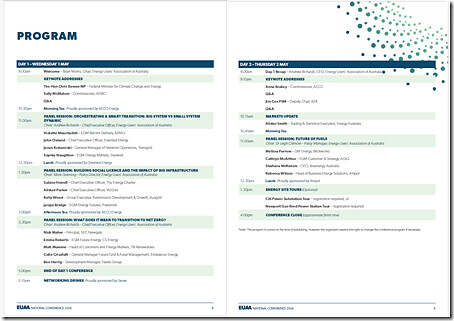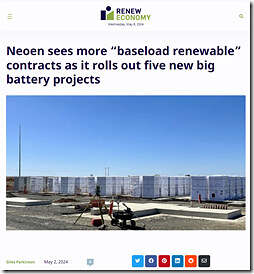Last week I was on the road a bit, in part for the National Conference of the Energy Users Association of Australia (EUAA) in Melbourne:
What follows is the start of some reflections from me about what I observed over the conference
1) The value of the event
For us (i.e. at Global-Roam Pty Ltd) we’ve been a keen supporter of the EUAA for ~20 years, because we see that the organisation does very useful things to advocate for the concerns of large energy users with respect to what’s been unfolding in the electricity and gas sectors in Australia.
Because our client base includes a number energy users who are (and/or could be) EUAA members, we’ve found if very useful to participate in these events as a means of efficiently having many conversations with these clients and others at these events … and listening to the concerns raised by energy users and their representatives.
2) Cognitive dissonance in the energy transition
During the event we heard the oft-repeated line that goes along the line of…
‘[the modelling suggests that] firmed renewables is the cheapest form of new energy …’
… but through the event (via presentations and direct conversations) we’ve continued to hear about the concerns of energy users that their cost of energy consumption is going up in the future, compared to what they had paid some 5 or 10 years ago.
Whilst it’s generally acknowledged that energy costs of yesteryear (back in the ‘coal was king’ pre-transition days) excluded a price on carbon, the energy users are still trying to grapple with how to manage this increase in underlying costs.
3) The other ‘baseload’ challenge
If you listened only to much of the discourse on social media with respect to the energy transition, you could be forgiven for assuming that ‘baseload’ is a term that was used exclusively for types of power generation technology that are (or were) relatively high capex and relatively low opex … and so because of economics, and then also because of technical design, are best suited to run continuously.
… think ‘base load’ coal units in the NEM, and nuclear in other locations.
But it always was the case that there are also ‘base load’ type of energy users that were (historically, at least) blessed with the same type of operating profile … and so were a good match for electricity system designers in days of yesteryear.
… think aluminium smelters (or other large energy users) being built or expanded in lock-step with coal unit expansions
These types of energy users (many of them EUAA members) have been struggling to source ‘whole service’ power purchase agreements that have felt a bit like ‘square peg in round hole’ with respect to the ‘VRE + firming’ philosophy for the new energy system.
3a) A glimmer of hope?
Hence it was noticeable when one of the speakers (can’t remember who) called out the RenewEconomy article ‘Neoen sees more “baseload renewable” contracts as it rolls out five new big battery projects’ as providing some much-needed promise to their hopes of bring able to continue to play a role in the NEM:
Of course, the devil is in the detail (e.g. is it really a ‘baseload’ offering, and at what price?) … but at least it was welcome news at the conference.
3b) What of baseload consumption in the CIS?
We’ve written a number of articles previously about the Capacity Investment Scheme … and I’ve also highlighted my surprise/concern at seeing something originally focused on providing firming capacity being hijacked to now predominantly support VRE.
It was notable that:
1) there were conversations at the EUAA National Conference about what value (from an electricity system design) large energy users deliver to the integrated energy system as a result of their large, stable and predictable consumption profiles … with the added benefits on top being the option for occasional flexibility such as we have been supporting for years.
2) this led to questions about whether these values might be supported in something like a (baseload consumption) Capacity Retention Scheme.
More might come later, time permitting …




Leave a comment